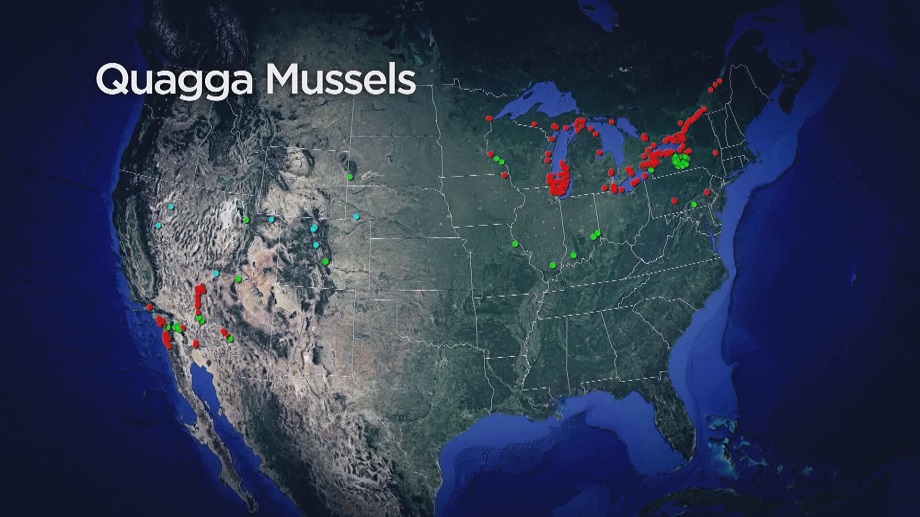DUNNOTTAR — The docks have been pulled and the piers on Lake Winnipeg have been put away. The lake is at rest for the winter season but those who live on it are uneasy.

“Two years ago we found zebra mussels on one pole and this year they’ve increased at least ten times, if not more,” Rick Gamble from the village of Dunnottar said.
READ MORE: Could trillions of zebra mussels be in Manitoba’s future?
Dozens of now rotting zebra mussels are slowly falling off the steps the village uses during the summer, and underneath several boats a carpet dead zebra mussels blankets the ground.
Like many who live off the lake, Gamble is not only worried about how the zebra mussels might multiply over the winter, but what might be coming next.
The quagga mussel has muscled it’s way into several lakes in the United States as was as Ontario, and experts say in many cases, they’ve completely taken over the zebra mussel.
MAP: Quagga mussel activity across North America
“If you think zebra mussels are bad, quagga mussels are actually far worse to the province of Manitoba,” Candace Parks, the invasive species specialist with Manitoba Conservation said.
Zebra mussels cling to hard surfaces while quagga mussels attach to anything soft. They can also spawn in cooler temperatures, meaning they could potentially continue reproduction in the winter months.
“It could possible blanket the province of Manitoba,” Parks said.
RELATED: Lake Winnipeg is a lost cause due to zebra mussels: expert
Zebra mussels were first discovered in Manitoba in 2013. Quagga mussels are not in any lakes in the province, or even in North Dakota.
Both species filter nutrients from the water, the very base of the food chain fish rely on.
Fred Sitkins has studied the species in Lake Michigan and says he’s heard extreme estimations that with time, they could filter the entire volume of the lake.
The director with the Inland Seas Education Association says in the last few years the combination of zebra and quagga mussels has pushed lake clarity in certain areas from six meters, to sixteen meters.
“Our salmon population in Lake Michigan is experiencing a real decline right now,” Sitkins said.
Like the zebra mussel they can clog everything from fishing nets to research equipment, water or hydro infrastructure.
This is the second of a three story series focused on zebra mussels and the damage they can do
FIRST: Could trillions of zebra mussels be in Manitoba’s future?
THIRD: “Lake Winnipeg is not dead”: expert on zebra mussels
- Enter at your own risk: New home security camera aims paintballs at intruders
- Boston Dynamics unveils ‘creepy’ new fully electric humanoid robot
- Nova Scotia scraps spring bear hunt idea, public ‘very divided’ on issue
- Ontario First Nation calls for chemical plant to be shut down amid ‘dangerously high’ benzene levels




Comments